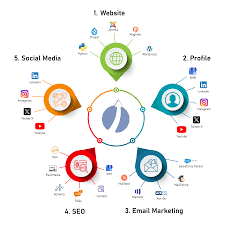
Revolutionising Marketing Strategies: The Power of Digital Transformation in Digital Marketing
The Impact of Digital Transformation in Digital Marketing
In the ever-evolving landscape of marketing, digital transformation has emerged as a game-changer, reshaping the way businesses connect with their audiences and drive growth. The fusion of technology and marketing strategies has paved the way for innovative approaches that are more targeted, personalised, and effective.
Enhanced Customer Engagement
Digital transformation in digital marketing has revolutionised customer engagement by enabling brands to interact with their target audience in real-time across multiple platforms. Through social media, email campaigns, and personalised content, businesses can create meaningful connections with customers, leading to increased brand loyalty and advocacy.
Data-Driven Decision Making
One of the key advantages of digital transformation in marketing is the abundance of data available for analysis. By leveraging analytics tools and customer insights, businesses can make informed decisions to optimise their marketing strategies. This data-driven approach allows for greater precision in targeting the right audience with the right message at the right time.
Personalisation and Customisation
Personalisation has become a cornerstone of successful digital marketing campaigns. Through data analysis and automation tools, businesses can tailor their messaging to individual preferences and behaviours. This level of customisation not only enhances customer experience but also drives higher conversion rates and ROI.
Omni-Channel Marketing
Digital transformation has facilitated the integration of multiple channels into cohesive marketing strategies. From social media to email marketing to mobile apps, businesses can engage with customers seamlessly across various touchpoints. This omni-channel approach ensures a consistent brand experience and maximises reach and impact.
The Future of Digital Marketing
As technology continues to advance rapidly, the future of digital marketing holds endless possibilities. Artificial intelligence, augmented reality, voice search optimisation, and other emerging technologies are set to further transform how businesses connect with their audiences. Embracing digital transformation is no longer an option but a necessity for staying competitive in today’s market.
In conclusion, digital transformation has revolutionised the landscape of digital marketing by empowering businesses to connect with customers in more meaningful ways. By leveraging technology, data insights, personalisation strategies, and omni-channel approaches, companies can drive growth and stay ahead in an increasingly digitised world.
Understanding Digital Transformation in Digital Marketing: Key Areas, Differences, and Core Pillars
- What are the 4 main areas of digital transformation?
- What is the difference between digital transformation and digital marketing?
- Is digital marketing the same as digital transformation?
- What is digital transformation and example?
- What are the 5 pillars of digital transformation?
What are the 4 main areas of digital transformation?
In the realm of digital transformation in digital marketing, understanding the four main areas of focus is crucial for businesses aiming to thrive in the digital age. These four key pillars encompass customer experience, operational processes, business models, and workforce enablement. By strategically addressing these areas, businesses can enhance customer engagement, streamline operations, innovate their business models, and empower their workforce with the tools and skills needed to succeed in today’s digital landscape. Embracing digital transformation across these core areas is essential for staying competitive and relevant in an ever-evolving market.
What is the difference between digital transformation and digital marketing?
Digital transformation and digital marketing are two distinct yet interconnected concepts in the realm of modern business strategies. While digital marketing focuses on promoting products or services through online channels to reach and engage target audiences, digital transformation encompasses a broader scope of integrating digital technologies across all aspects of a business to enhance operations, customer experiences, and overall growth. In essence, digital marketing is a component of digital transformation, highlighting the importance of leveraging technology not just for promotional purposes but for holistic organisational advancement in today’s digitally-driven world.
Is digital marketing the same as digital transformation?
The frequently asked question of whether digital marketing is the same as digital transformation often arises in discussions about modern marketing strategies. While digital marketing focuses on leveraging digital channels to promote products or services and engage with customers, digital transformation encompasses a broader organisational shift towards integrating technology into all aspects of a business. Digital marketing is a component of digital transformation, playing a vital role in reaching and engaging target audiences effectively. However, digital transformation goes beyond marketing efforts to encompass changes in processes, culture, and technology adoption across the entire organisation to drive innovation and growth in the digital age.
What is digital transformation and example?
Digital transformation in the realm of digital marketing refers to the strategic integration of technology and innovative practices to revolutionise how businesses engage with their target audience and drive growth. An example of digital transformation in action is the shift towards personalised marketing strategies using data analytics and automation tools. By leveraging customer insights and behavioural data, businesses can tailor their messaging to individual preferences, creating a more engaging and relevant experience for their audience. This approach not only enhances customer satisfaction but also boosts conversion rates and overall marketing effectiveness.
What are the 5 pillars of digital transformation?
In the realm of digital transformation in digital marketing, the concept of the “5 pillars” serves as a guiding framework for businesses seeking to navigate and leverage technological advancements effectively. These pillars typically encompass key elements such as customer experience, operational agility, culture and leadership, workforce enablement, and digital technology integration. By focusing on these foundational pillars, organisations can streamline their digital strategies, enhance customer engagement, foster innovation within their teams, and adapt to the ever-changing digital landscape with resilience and success.